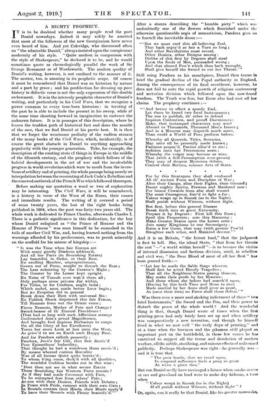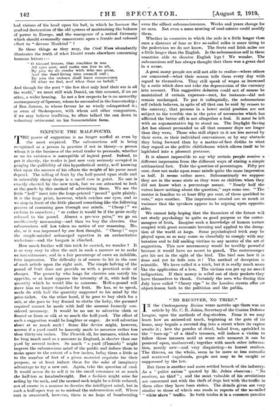A MIGHTY PROPHECY.
TT is to be doubted whether many people read the poet 1 Daniel nowadays. Indeed it may safely be asserted that most of the followers of the new Georgianism have never even heard of him. And yet Coleridge, who discoursed often on " the admirable Daniel," always insisted upon the conspicuous modernity of his style. " Quite modern in comparison with the style of Shakespeare," he declared it to be, and he would sometime-3 quote as chronologically parallel the work of Sir George Beaumont or of Wordsworth. The modern quality of Daniel's writing, however, is not confined to the manner of it. The matter, too, is amazing in its prophetic scope. Of course it must be remembered that Daniel was an historian by nature and a poet by grace ; and his predilection for dressing up pure history in didactic verse is not the only expression of this double endowment. It is in the intensely prophetic character of Daniel's writing, and particularly in his Civil Wars, that we recognize a power common to every true-born historian : in treating of the past he is able to include the present in his sweep, while at the same time shooting forward in imagination to embrace the unknown future. It is in passages of this description, where he leaves the trodden path of historical fact and dons the mantle of the seer, that we find Daniel at his poetic best. It is then that we forget the wearisome prolixity of the endless stanzas of the many books of the Civil Wars, which, incidentally, is of course the great obstacle in Daniel to anything approaching popularity with the younger generation. Take, for example, the description of the existing state cf things in Europe in the middle of the fifteenth century, and the prophecy which follows of the baleful developments in the art of war and the incalculable progress in world-revolution which were to result from the inven- tions of artillery and of printing, the whole passage being merely an interpolation between the recounting of Jack Cade's Rebellion and the renewed outbreak of the French War which followed thereupon.
Before making our quotation a word or two of explanation may be interesting. The Civil Wars, it will be remembered, is a history in verso of the Wars of the Roses, their causes and immediate results. The writing of it covered a period of some twenty years, the last of the eight books being published in 1604, when the poet was forty-two years old. The whole work is dedicated to Prince Charles, afterwards Charles I. There is a pathetic significance in this dedication, for the boy whom Daniel eulogized as " the Prince of Honour and the Honour of Princes " was soon himself to be enmeshed in the toils of another Civil War, and, having learned nothing from the warnings afforded by his predecessors, was to perish miserably on the scaffold for his misuse of kingship :-
" It was the Time when fair Europa sat
With many goodly Diadems addross'd, And all her Parts (in flourishing Estate) Lay beautiful, in Order, at their Rost.
No swelling Member, unproportionate, Crown out of Form, sought to disturb the Rest ; The Less subsisting by the Greater's Might ; The Greater by the Lesser kept upright.
No Noise of Tumult ever wak'd them all ; Only perhaps some private Jar within, For Titles, or for Confines, might befal ; Which ended, soon made better Love begin ; But no Eruption did in general Break down their Rest with universal Sin : No Publick Shock disjointed this fair Frame, Till Nemesis from out the Orient came ; Fierce Nemesis, Mother of Fate and Change !
Sword-bearer of th' Eternal Providence !
(That had so long with such Afflictions strange Confounded Asia's proud Magnificence, And brought foul impious Barbarism to range On all the Glory of her Excellence) Turns her stern Look at last unto the West, As griev'd to see on Earth such Happy Rest.
And for Pandora calleth presently ; Pandora, Jove's fair Gift, that first deceiv'd Poor Epimetheus' Imbecility, That thought he had a wondrous Boon receiv‘cl ; By means whereof curious Mortality Was of all former Quiet quite bereav'd To whom Wing come, deck'd with all Qualities, The wrathful Goddess breaks out in this wise :
Dost thou not see in what secure Estate Those flourishing fair Western Parts remain ? As if they had made Covenant with 'Fate, To be exempted free from others' Pain '
•
At-one with their Desires, Friends with Debate ; In Peace with Pride, content with their own Gain ; In Bounds contain their Minds, their Minds apply'd To have their Bounds with Plenty beautify'd. After a stanza describing the " humble piety " which was undoubtedly one of the flowers which flourished under the otherwise questionable aegis of monasticism, Pandora goes on to foretell the inevitable doom :— " But we must cool this all-believing Zeal,
That hath enjoy'd so fair a Turn so long ; And other Revolutions must reveal, Other Desires, other Designs among : Dislike of this first by Degrees shall steal Upon the Souls of Men, persuaded wrong ; And that abused Pow'r which thus hath wrought, Shall give herself the Sword to cut her Throat.'"
Still using Pandora as his mouthpiece, Daniel then traces in brief the gradual decline of the Papal authority in England. Among the consequences of its final overthrow, however, he does not fail to note the rapid growth of religious controversy and sectarian division which followed upon the new-found freedom. The Truth was free, but Error also had cast off her chains. The prophecy continues
"'And better to effect a speedy End, Let there be found two fatal Instruments ; The one to publish, th' other to defend Impious Contention, and proud Discontents : Make, that instamped characters may send Abroad to Thousands, Thousand Men's Intent ; And in a Moment may dispatch much more, Than could a World of Pons perform beforo.
Whereby all Quarrels, Titles, Secrecies, May unto all be presently made known ; Factions' prepar'd, Parties alined to riso ; Sedition unto fair Pretensions sown ; Whereby the vulgar may become so wise, That (with a Self-Presumption over-grown) They may of deepest Mysteries debate, Control their Betters, censure Acts of State.
For by this Stratagem they shall confound All th' ancient Form and Discipline of War ; Alter their Camps, alter their Fights, their Ground; Daunt mighty Spirits, Prowess and Manhood mar : For basest Cowards from afar shall wound The most Courageous, forc'd to fight a-far ; Valour wrapt up in Smoak (as in the Night.) Shall perish without Witness, without Sight.
But first, before this general Disease Break forth into so great Extremity, Prepare it by Degrees : First kill this Ease ; Spoil this Proportion; mar this Harmony : Make Greater States upon the Lesser seize ; Join many Kingdoms to one Sovereignty : Raise a few Great, that may (with greater Pow'r) Slaughter each other, and Mankind devour.'"
And it is on Britain, " the fairest land," that the judgment is first to fall. She, the island State, " that from her thrusts the rest "—" a world within herself "—is to become the victim of internal dissension and factious division, until, in rebellion and civil war, " the Dear Blood of most of all her Best " has been poured forth:—
"'Let her be made the Sable Stage whereon Shall first be acted Bloody Tragedies ; That all the Neighbour-States gazing thereon, May make their profit by her Miseries : And those whom she before had march'd upon, (Having by this both Time and Mean to rise) Made martial by her Arms shall grow so great, As (save their own) no Force shall thorn defeat.' "
Was there ever a more soul-shaking indictment of those " two fatal Instruments," the Sword and the Pen, and their power to disturb the peace of the whole world ? And the wonderful thing is that, though Daniel wrote of times when the first printing-press had only lately been set up and when artillery was comparatively a new invention, and though he himself lived in what we now call " the early days of printing," and at a time when the bowman and the pikeman still played an important part on the battlefield, in these few verses ho has contrived to suggest all the terror and desolation of modern warfare, all the subtle, sterilizing, and ruinous effects of unlicensed publicity. Perhaps Shakespeare was right—lie generally was--
and it is true that
" The poor beetle, that we tread upon, In corporal sufferance finds a pang as great As when a giant dies."
But can Daniel really have envisaged a future when smoke-screen at sea and gas-cloud on land were to make day hideous, a time
when " Valour wrapt in Smoak (as in the Night)
St all perish without Witness, without Sight "
Or, again, can it really be that Daniel. like his greater namesake.
had visions of his head upon his -bed, in which he foresaw the gradual destruction &the old system of maintaining the balance of power in Europe, and the -emergence of a united Germany which should eventually concentrate upon -a frantic and colossal effort to " devour Mankind " ?
Be these things as they may, the Civil Ware Abundantly illustrates the truth of what Daniel wrote elsewhere concerning humane letters :-
" 0 blessed letters, that combine in one All ages past, and make one live 'hi By you wo do confer with who rare gone, And the dead-living into -council call ; By you the unborn shall have communion Of what we feel, and what does us befall."
And though for the poet " the few that only lend their ear is all the world," we must still wish Daniel, on this account, if on no other, a wider hearing. In net a few respects he is no unworthy contemporary of Spenser, whom he succeeded in the laureateship-; of Ben Jenson, in whose favour he so wisely relinquished it-; or even of Shakespeare, with whom and other companions, if we may believe tradition, he Often talked the sun down in voluntary retirement on his Somersetshire farm.



































 Previous page
Previous page